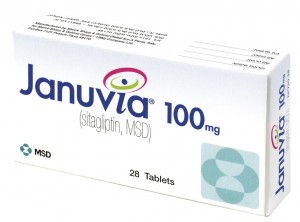 Januvia (generic name sitagliptin) is a comparatively new entrant to the diabetes pharmaceutical market. Januvia is the first of a new class of diabetes drugs known as dipeptidyl peptidase-4 (DPP-4) inhibitors. Januvia is manufactured by large drug maker Merck, and is prescribed for the treatment of Type2 diabetes mellitus.
Januvia (generic name sitagliptin) is a comparatively new entrant to the diabetes pharmaceutical market. Januvia is the first of a new class of diabetes drugs known as dipeptidyl peptidase-4 (DPP-4) inhibitors. Januvia is manufactured by large drug maker Merck, and is prescribed for the treatment of Type2 diabetes mellitus.
Unfortunately, many recent medical studies have pointed to a relation between DPP-4 medications like Januvia and significant complications. Patients who take diabetes drugs like Januvia may be at an increased risk of suffering from pancreatic cancer.
Januvia was originally manufactured by a subsidiary of Merck Pharmaceuticals and approved by the United States Food and Drug Administration (FDA) initially in late 2006. The release of Januvia marked the first of a new category of Diabetes drugs known as DPP-4 inhibitors. Januvia is a diabetes medication taken orally meant to help control blood sugar. People who suffer from diabetes commonly experience spikes in blood sugar, and Januvia is meant to temper those spikes.
While Januvia may be effective in the treatment of type 2 diabetes symptoms, it may also be responsible for severe and dangerous side effects. Recent reports have surfaced claiming that there may be a link between the use of Januvia and pancreatic cancer. United States regulators have allegedly received more than 80 claims of significant pancreatic disorders including Januvia pancreatic cancer.
Due to increased chatter of potential Januvia pancreatic cancer cases, a research team from the UCLA medical school decided to study the Food and Drug Administration (FDA) database of adverse Januvia events between 2004-2009. They determined that there may in fact be an increased risk of Januvia pancreatic cancer when taking the type 2 diabetes drug.
The report claims that drugs like Januvia may increase the risk of cancer due to the impact that they have on the immune system. The American Gastroenterological Association’s (AGA) official newspaper, GI & Hepatology News published a report claiming that the risk of pancreatic cancer was elevated by Januvia by 6.7 times compared to related control medications.
Pancreatic cancer, or carcinoma of the pancreas describes the condition of cancerous cells infiltrating the pancreas. The pancreas is the organ found near the stomach which exudes enzymes to the intestines designed to assist the organ in the absorption of nutrients. Unfortunately, pancreatic cancer, including Januvia pancreatic cancer is particularly insidious because it is rarely diagnosed early on and it tends to spread rapidly through the body.
Januvia and Pancreatic Cancer Lawsuit
If you or a loved one has taken Januvia for the treatment of Type 2 diabetes and has subsequently developed pancreatic cancer, you are not alone. You may be entitled to financial compensation from the manufacturers through a Januvia Pancreatic Cancer Lawsuit against the makers of the potentially harmful drug. There is reason to believe that the manufacturer knew or should have known about these potential Januvia pancreatic cancer risks. Please call one of our pharmaceutical liability lawyers today for a free consultation regarding your Januvia Lawsuit. All Januvia lawsuits are processed on a contingency fee basis, which means that you don’t pay anything unless your case is successful.

